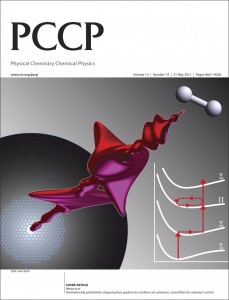*Deadline for Oral Abstracts: 17 August 2012*
Submit now to events@rsc.org
Photochemistry and molecular photophysics have been highly active fields of research for more than half a century; however, during the last two decades synergistic advances in experimental technology and computational methodology have led to a renewed interest in understanding photochemistry and photophysics at the quantum level – photo-initiated quantum molecular dynamics. One of the grand challenges for the 21st century is to develop such a detailed understanding of energy flow in molecules, following the absorption of a photon, that we can begin to develop the knowledge and tools to control photochemistry. Photo-initiated Quantum Molecular Dynamics: Faraday Discussion 163 will involve spectroscopy and dynamics, experiment and theory, with themes including:
- Single molecules: photochemistry and photophysics in isolated molecular systems
- Extended systems: photochemistry and photophysics of chromophores in proteins, solution or clusters
- Controlling molecular dynamics: controlling photochemistry using sequences of light pulses, shaped light pulses or bond selection prior to photoexcitation
- Applications of molecular dynamics to global challenges: photovoltaic cells, photodynamic therapy, imaging.
Confirmed invited speakers:
- Professor Albert Stolow (Introductory), National Research Council, Canada
- Professor Graham Fleming (Closing), University of California – Berkeley, USA
- Professor Phil Bucksbaum, Stanford University, USA
- Professor Joachim Burgdörfer, Vienna University of Technology, Austria
- Professor Wolfgang Domcke, Technische Universitat Munchen, Germany
- Professor Bob Field (Robert W Field), Massachusetts Institute of Technology, USA
- Professor Dr Jennifer Herek, Twente, Netherlands
- Professor Dr Eberhard Riedle, Ludwig-Maximilians-Universität, Germany
- Professor Ursula Rothlisberger, EPFL, Switzerland
- Professor Greg Scholes, University of Toronto, Canada
Faraday Discussions are a long-established series of meetings which provide a unique international platform for the exchange of views and newly acquired results in developing areas of physical chemistry, biophysical chemistry and chemical physics. The Discussion is a dynamic forum for developing and exchanging exciting new ideas, and both the papers and discussion will be published in a final printed volume. The latest Impact Factor is 5.0.
We invite you to submit an abstract for an oral presentation by the 17th August to events@rsc.org adding ‘FD163 abstract’ in the subject line. We hope to see you at this exciting Faraday Discussion meeting next year.
Faraday Discussions is a sister journal to Physical Chemistry Chemical Physics (PCCP). PCCP brings you content of the highest quality in physical chemistry, chemical physics and biophysical chemistry. With high-impact research, and a truly international readership, PCCP is the ideal place to publish. We invite you to submit your research to PCCP today.
 Read these PCCP themed issues:
Read these PCCP themed issues:
Ultrafast chemical dynamics
Guest Editors: Klaas Wynne and Neil T. Hunt
Phys. Chem. Chem. Phys., 2012, 14, Issue 18
Electronic energy transfer
Guest Editor: Anthony Harriman
Phys. Chem. Chem. Phys., 2010, 12, Issue 27
Analysis and control of ultrafast photon-induced processes
Guest Editors: Vlasta Bonačić-Koutecký, Nikolaus Ernsting, Joshua Jortner, Jörn Manz, Eckart Rühl and Ludger Wöste
Phys. Chem. Chem. Phys., 2011, 13, Issue 19



















